Given the recent implosions of BlackBerry, Palm, Nokia, Microsoft, can we safely assume that Apple is next and will likely fail before the year is out, simply because, well… Android?
What is Android?
Of course, you might be thinking, "but Apple earns three quarters of the mobile industry's profits and an even greater majority of the world's mobile app revenues. It has a successful desktop platform, millions of loyal customers who rank it far higher in satisfaction than Android, and it has a coherent strategy…"
Well let me stop you right there: this is the Internet! We don't need facts or logic. The whole point of an open platform like the web is that you can celebrate the sheer volume of mouths in motion rather than focusing on the actual performance or reputation of any particular one of them.
And just like the web, Android doesn't have to profit to be wildly successful. As a loose ideology, it can be both the state of the art in mobile technology (Android 4.3 with NFC!) and, at the same time, the outdated and buggy version the majority is actually stuck with.
Android is regarded a omniscient deity that gets credit for everything positive that ever happens without also getting blamed for all of the ugly cruelty and suffering in the world. Apple is more like the scientist who cures cancer, only to hear complaints of "why didn't you do that last year?" and "so you're not going to cure my obesity? What a jerk!"
After acquiring and deploying C3's technology for turning satellite images into interactive 3G maps last year, Apple's work has remained the subject a bizarre level of contempt. Just this week, CNET mocked a 3D image of a plane appearing on a tarmac as "bad news for passengers." Really? Is somebody going to get lost underneath that jet on the runway?
The same sort of scorn hasn't been applied to Google Maps and Earth, which continue to portray Hoover Dam in false perspective and with a collapsed bridge a year after Apple was assailed for its own flawed rendering. Google doesn't even integrate global 3D imagery in Android's Maps+Navigation app, it's just sort of assumed that, just because it looks like an iPhone, it does everything an iPhone can do.
A bigger issue for the definition of "Android" is that it's not just the 66 percent of Google Play users that have no access to a modern version of Android; it's also the majority of the growing, "white box" market that is outpacing Samsung and the other Android licensees that everyone identifies as "Android."
As Needham's Charlie Wolf noted in a piece this morning by Philip Elmer-DeWitt of Apple 2.0, "most of these companies, located in China, have entered the market with low-end, cheaply produced Android phones that are not much more expensive than feature phones."
Wolf added, "Indeed, most buyers of these phones use them as feature phones."
What is Android doing?
Turning feature phones running some old version of a Java-like mobile OS into modern smartphone owners shouldn't be so difficult, right? After all, that's what Apple did with the iPhone, the reason why Nokia and its Symbian platform is no longer very relevant. Android is being swallowed by mediocrity so rapidly that it today looks more like an 8 year old Windows XP in 2009 than Windows XP actually looked in 2009. This is particularly remarkable given that Android is really only 4 years old.
So why is Google simply maintaining the status quo rather than affecting real change with Android to turn basic mobile owners into modern smartphone users? Part of the problem is that not even Samsung, the leader of Android licensees, is producing mostly modern smartphones.
Android is being swallowed by mediocrity so rapidly that it today looks more like an 8 year old Windows XP in 2009 than Windows XP actually looked in 2009. This is particularly remarkable given that Android is really only 4 years old.
Unlike Apple's iPhone, where the installed base since 2010 overwhelmingly runs modern iOS 6 software on modern A4-class hardware with features like a Retina Display and 6-axis motion sensors, Android is fractured not only in software but also in hardware capabilities, from the display to the screen technology down to the GPU cores.
That's what's really keeping Android software fragmented, and that fragmentation is keeping Android from accomplishing anything of real value other than converging Java feature phones into Dalvik feature phones.
What if Google realizes what Android is doing?
At some point, Google might realize that, in order to have a mobile platform like Apple, it will need to do some of the work Apple is doing. After experiencing the same sort of frustration Microsoft had with its innovation-deprived PC and then MP3 "PlaysForSure" partners, Google followed the same Zune strategy of releasing its own hardware.
Google even spent $12.5 billion to acquire Motorola, the leading Android hardware failure, to prove that Microsoft's Zune strategy doesn't work even if you buy the Toshiba behind it. After the failure of Google's Android 3.0 Honeycomb and Motorola's Xoom in 2011, Google set out to more closely copy the Zune in a loose partnership with Asus to bring the Nexus 7 to market in 2012. That didn't magically result in a iPad style success either.
The only other way Google could pursue a more Zune-like strategy is by going "Zune HD" and bringing substantial work inside to deliver a new tablet product targeting the iPad years after it first became established. Google is due to release exactly that next year under its X brand.
Really, how is it that Google's spectacular history of failure in Android tablets remains so quiet?
The real problem for Google is not that it is ineffectually copying Microsoft's Zune, but that Android is actually copying Apple's miserable history of the Mac System Software from the mid 1990s. Just as with the half decade of tepid updates of Apple's System 7, Google has largely just rolled in features invented by hobbyist users.
There's no apparent strategy (outside of NFC, which is failing without iOS support) and no effort to jump the platform ahead of the game by inventing anything spectacularly new.
Instead, just like the Old Apple, Google is following the advice of those who thought Microsoft-style OS licensing was the only way to sell technology. The problem is that Microsoft-style licensing has only ever worked for Windows, and it only worked when Windows had a virtual monopoly that restrained all competition. Android doesn't have a monopoly over mobile devices, and it isn't holding back Apple from bringing products to market or selling them. Not at all.
In fact, the only way to make Android look competitive against iOS is to bundle in a huge segment of feature phones under the now meaningless term "smartphone," and ignore profitability and platform success in order to focus only on unit shipments.
That's the same sort of creative math that Gartner and IDC used to hide the reality that the iPad was deeply gouging the PC market until "surprise!" they could announce that "there is something dreadfully wrong with PC sales and who could have possibly predicted this shift in the market that we failed to see, despite it being our primary job as market research firms?!"
Google's Android shares much more in common with Apple's failed Mac OS licensing program from the mid 1990s than Microsoft Windows. Apple once struggled to compete against its own licensees, couldn't ask for enough licensing money to justify its engineering costs and faced stiff competition from an entrenched competitor with a much stronger platform. Now Google does.
Also like the Old Apple, Google is wasting its resources on a 7 inch tablet that users aren't buying in sustainable volumes because it has no specific function and what it does do is sort of half baked and has rough edges. Google is successfully copying Apple, but it's copying the wrong decade.
The decade Google should be copying is the one where Apple built out a global retail chain; developed incredible first party native apps (like Final Cut Pro, iWork and iLife) to show off its platforms; assembled an in-house processor design group to take control of the future of device hardware and developed a operating system that could scale from workstation PCs to mobile devices, sharing technology advancements across its product line. Google hasn't done any of those things.
What if Samsung realizes what Google is doing to Android?
If Google isn't empowering Android to compete against Apple, then might Samsung? Unlike Google, Samsung is vertically integrated and quite competent at building hardware products. It even has produced a series of first party apps, although not quite on the scale of Apple.
Samsung also has its own leading chip design and fab, something that Apple has taken advantage of and even found it difficult to divorce itself from. Samsung doesn't have a software platform however, leaving it to hop between Windows Phone, Windows and Android (or combine them). That has has put it at the mercy of mistakes originating at Microsoft and Google, including grievous security lapses it has attempted to bandage with acquisitions like Knox.
Samsung has also tried to replicate Apple's retail stores, announcing, just like Microsoft, a plan to open 1400 mini-stores inside Best Buy. However that too is something that's tied a lot closer to Apple's failure in the 1990s than Apple's more recent retail success.
After opening lots of "stores within a store" in partnerships with various big box retailers, Apple promptly began closing them because they didn't work. It has since focused its retail efforts on stores it owns and can control.
I could next write about the prospects of other Android licensees to more effectively take over and destroy Apple, but that would strain credulity. And that's because the entire premise of Android existing as an open platform to challenge Apple's "closed, walled garden" by empowering innovation and competition across the industry has imploded, just like Microsoft's similar claims that Windows worked as this open platform for expanding choice.
Rather than serving some grandiose "open" purpose, the primary thing Windows and Android have done is to hide incompetence, reward failure and transfer intellectual property from an inventor to a pool of manufactures with myopic vision and waning creativity. They do this by forging a coalition between huge volumes of garbage products and a tiny minority of modern, decent products.
In the end, the promise of freedom and choice boils down to a monoculture where there is no choice, or there are silly choices like Samsung's PC that runs Windows 8 paired with a tablet-like screen that runs Android, so that when you want to relax on the couch you can detach your system and continue to play Cut the Rope, but with ads.
Realize what Apple is doing to Samsung, Google and Android
Apple's iOS 7 is highlighting a variety of things the company is doing that its competitors aren't. While critics tried to portray Apple as "catching up" with a "flat" appearance before iOS 7 even appeared, and then tried to maintain that there was nothing new to see here even after seeing it, a variety of observers from different places are now noting that Apple is doing something new.
For starters, iOS 7 looks new. It also looks different, and involves lots of novel ideas nobody has really used before in a mobile OS. Why does it use bright colors in icons and highlights, a largely white background, thin fonts, translucency and gyroscopic motion-based animations?
Some have suggested that the use of colors will appeal to Asian markets. That bright white backgrounds are difficult to copy on OLED screens (where white draws more power than black, as opposed to LEDs where backlighting is always required; this is why the Zune/Windows Phone is so overwhelmingly back). That thin fonts require typographical expertise and Retina Displays. That translucency requires A4 processing power, and that motion controls require a 6-axis gyroscope.
Put together, it sure looks like Apple is simply following its long term business plan of identifying advanced, enabling technologies and packaging them together in ways that communicate value for users. Apple scouts out hardware advances and software advances and sells the combination by developing clear and valuable applications for buyers, from FaceTime to Siri to Maps.
Google and Samsung have both done a good job at finding cool new technologies, but neither has done a very good job of applying them in useful ways. A lot of the tech media hasn't figured this out, preferring to instead be enamored with specifications like CPU GHz and GB of memory installed. That model, copied from the WinTel era, is collapsing. On mobile devices, it's not about how fast you can run Office, but how long your battery can run while doing lots of useful things that are fun.
And while the various elements of iOS 7 point to an effort by Apple to ditch competitors with applied hardware and software advances, it really comes down to delivering an experience that is fun, and that works. There will be more from Apple in 2013 related to both fun and work.
 Daniel Eran Dilger
Daniel Eran Dilger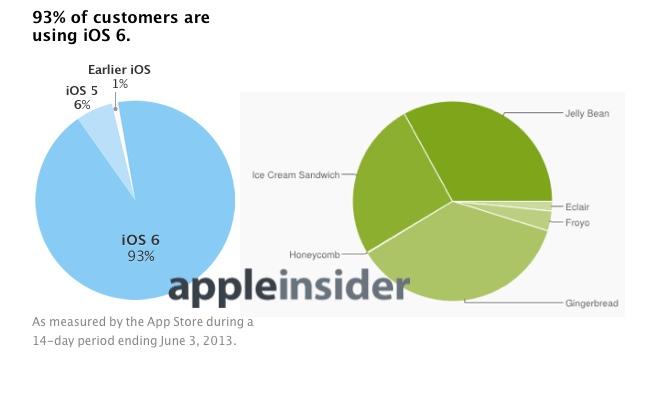


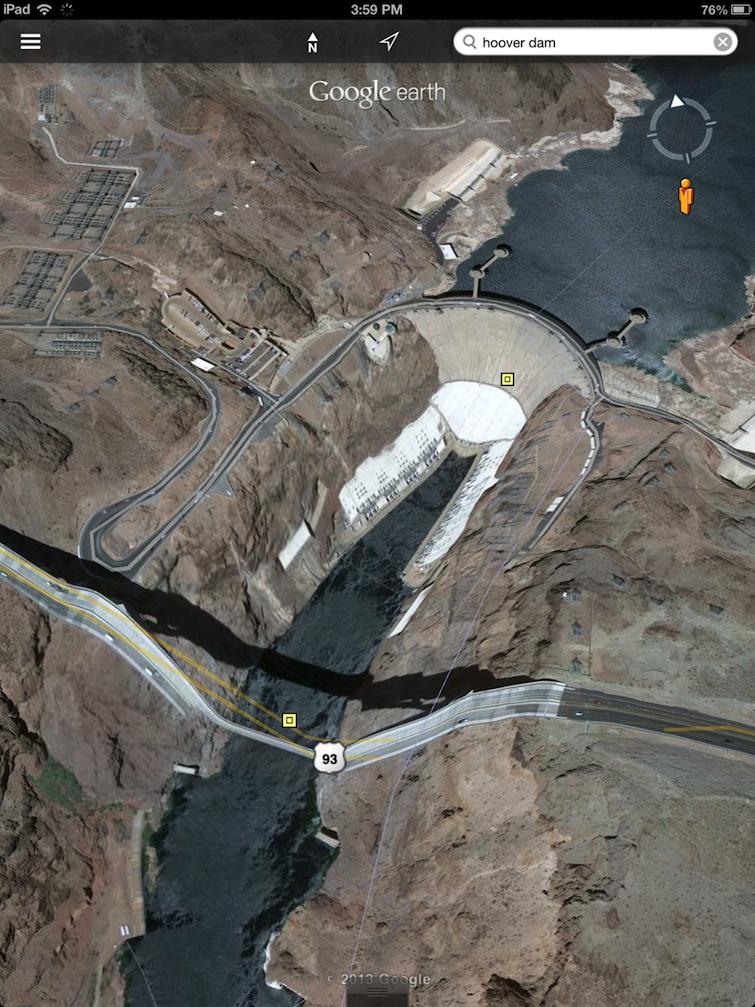
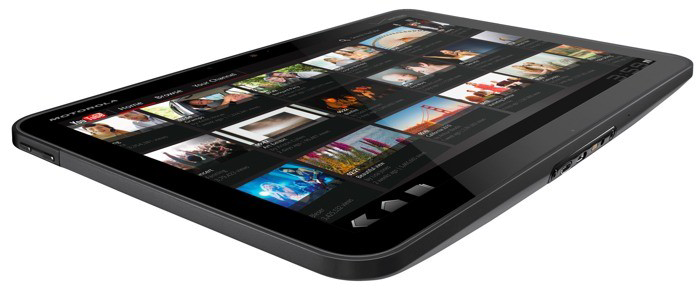

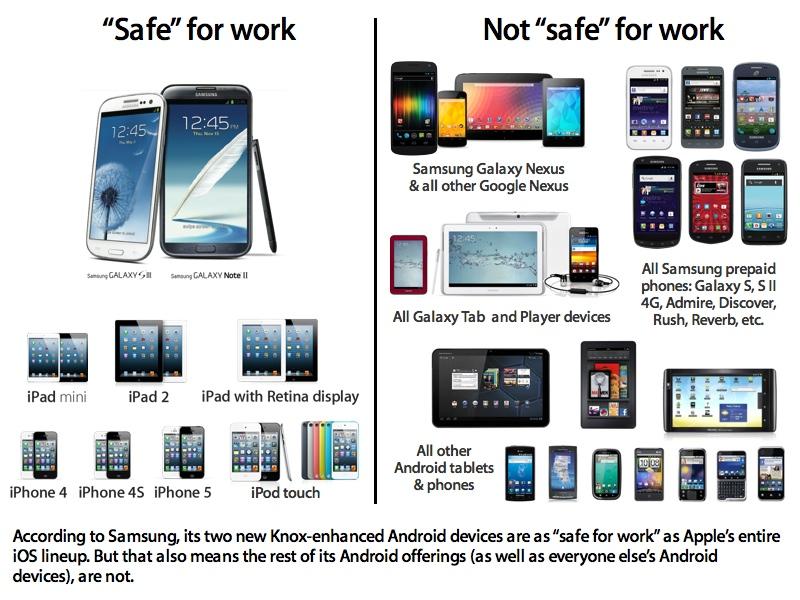
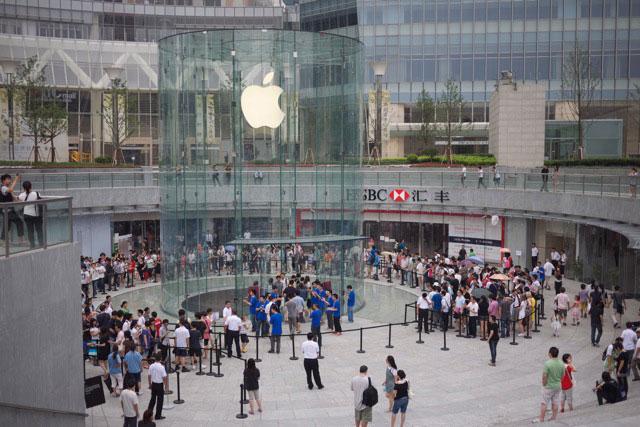
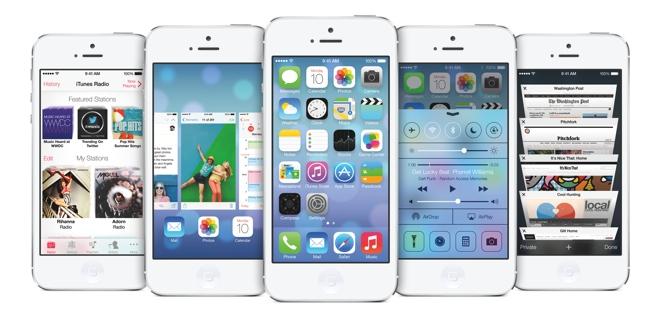

-m.jpg)





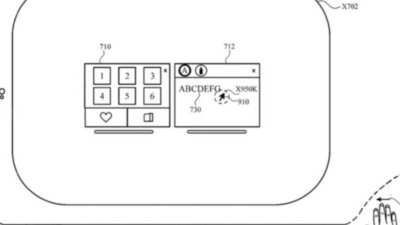
 William Gallagher
William Gallagher
 Malcolm Owen
Malcolm Owen

 Sponsored Content
Sponsored Content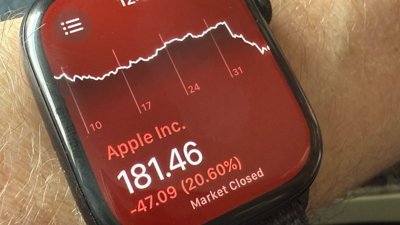

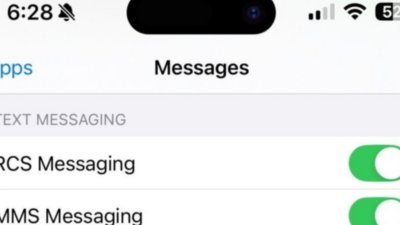
 Charles Martin
Charles Martin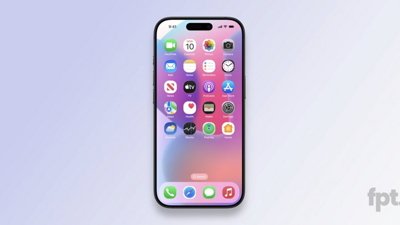
 Wesley Hilliard
Wesley Hilliard
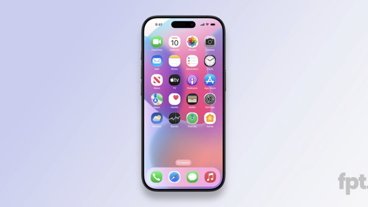








273 Comments
"Apple is more like the scientist who cures cancer, only to hear complaints of "why didn't you do that last year?" and "so you're not going to cure my obesity? What a jerk!" lol Applez teh doomed
This article is a joke. Apple might not be as strong but I got news for you. There will always be a market for people that doesnt want all the configurations that android offers and wants a walled garden. I know I do. I would like the extras that android features but I will also trust apple to make the decision for me to make the function simple. If they don't put it in ios because it was a decision that was made by apple, I am okay with it. That is why I pay apple for. I would much rather have the walled garden where things are screened. But I will not hate on android. Google is apples AMD. Intel needs it and so does apple. It keeps apple honest where the company wont get lazy. But they will never get left behind unless they lose their competitive spirit.
Seems they can. http://appleinsider.com/articles/13/06/28/iphone-5-takes-75-of-us-canada-4g-web-traffic-for-newer-smartphones [B]http://appleinsider.com/articles/13/06/28/apple-holds-39-of-us-smartphone-market-far-ahead-of-samsungs-23 [/B]
And, what will the paid Samsung "critics" say about this article?
I like the idea that the bright light/white display is to take advantage of Apple's display while making sure the OLED will kill its batteries trying the same. If this came out during the iPhone 3GS/4 days, it might have stopped Samsung. Better late than never though.